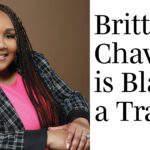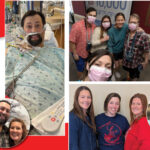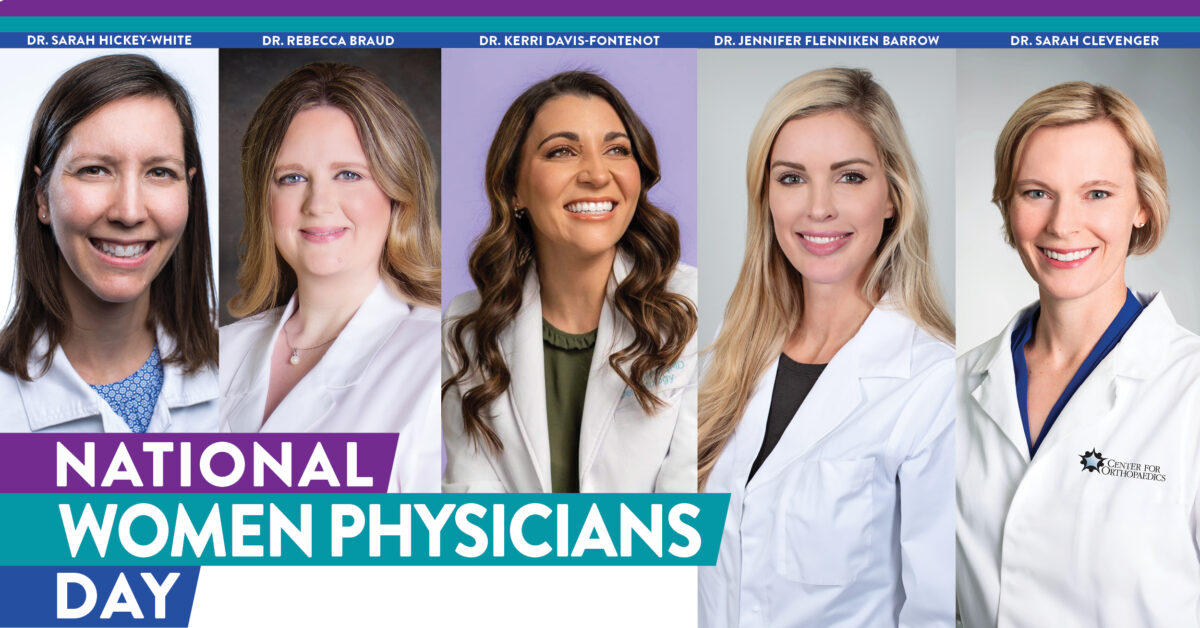
BLACK HISTORY MONTH: Brittany Chavis is Blazing a Trail
February 2025
Double the Heart: Two Couples, One Heartfelt Journey
February 2025February 3rd is National Women Physicians Day, which is the birthday of Dr. Elizabeth Blackwell, the first woman to earn her medical degree in the United States. The day honors the contributions made by female physicians across all specialties and the impacts they have on the health of our society.
The Association of American Medical Colleges says, in 2022, 38% of doctors in the country were women. This percentage can vary widely based on specialty. Here are some of SWLA’s amazing and gifted female physicians on what it’s like being a woman in medicine and what they love about their specialties.
Dr. Sarah Hickey-White: Pediatrics
by Madelaine Brauner Landry
Dr. Sarah Hickey-White, with The Pediatric Center, knows no direction except forward. “At day’s end, when you feel like you really did not work, but had fun, you know that you must be headed in the right direction.” Hickey-White says deciding to be a doctor while she was deployed to Iraq in 2005 was the right direction for her.
“I was in the army reserves as an Apache helicopter mechanic. Prior to deployment, I was a chemist for a pharmaceutical company. I considered going back to school for engineering. While deployed, I decided working more closely with people rather than from behind a desk suited me. I always knew I wanted to be in service to others.”
Seven years had elapsed since her college graduation, but she was accepted into medical school. “I love kids,” Dr. Hickey-White says. “After graduating with a chemistry degree, I spent my first summer making minimum wage as a YMCA camp counselor; I thought I might not have that opportunity again. After my first clinical rotation in pediatrics, I was fairly certain that this would be the direction I’d take.”
“Fortunately, I didn’t face many challenges becoming a female physician, which is a testament to how far society has come,” says Dr. Hickey-White. “Pediatrics is very female-dominated field, which may have sheltered me from some of those challenges. In my practice, I feel that people perceive you differently from male doctors, but not necessarily in a negative way. Parents seem somehow less intimidated, more willing to ask me honest questions because I am female. Young children are not as nervous with me either. I’m grateful for that! It’s much easier to exam a comfortable toddler versus one who is terrified. Working as a team with the nurse and parents, we figure it out either way.”
There are many things that still excite and surprise Dr. Hickey-White. “At this point in my career, I get most excited about diseases I have never seen before, as well as being able to build relationships with my patients and parents.”
Although, the majority of Dr. Hickey-White’s workday is spent seeing patients, she does enjoy the interaction she has with the staff and other providers. “I get to talk to my nurse and collaborate with other providers, but generally my day is filled with patients and their families. Once I get to know them, it is fun seeing them again; they would probably rather not be seeing me, unless it is for a checkup.”
“I tell patients, adolescents in particular, not to be afraid to follow their intuition after high school,” Dr. Hickey-White says. “It is challenging, but no one should discourage them from going into whatever they want if they want it badly enough. I was told how hard it would be to get into medical school. It was, but I did it. Interestingly, my first day of orientation, they asked us to raise our hand if our parents were doctors. About half my medical school class raised their hand! So, I try to encourage my patients to do what they want to do and not listen to the naysayers.”
Dr. Rebecca Braud: Family Medicine
by Kristy Como Armand
For Rebecca Braud, MD, becoming a doctor was not a lifelong dream, but one that began in college. “I always had a love for science, teaching, and nurturing others and, with the help of a college guidance counselor, realized that medicine would be a great combination of those skills. I love the science of medicine, and family medicine involves a great deal of teaching as well as direct patient care, allowing me to fulfill all of those interests.”
She credits volunteer work at the Baton Rouge Crisis Intervention Center while in college as one of the most valuable experiences in preparation for her future career. “As a phone crisis counselor, I learned valuable communication and crisis intervention skills that have served me well as a physician.”
After earning a Bachelor of Science degree in biochemistry with a chemistry minor, Dr. Braud went to medical school at LSU Health Sciences Center New Orleans. “I chose family medicine during my last year in medical school after working with numerous physicians in a variety of specialties and realizing that it best fit my personality and goals for the role I could play in patients’ lives.”
After completing a residency in family medicine at the LSU residency program in Lake Charles, she began a private practice. She is now a partner at Braud/Davies Family Medicine in Sulphur and on the medical staff of West Calcasieu Cameron Hospital.
Dr. Braud says she has had experiences in which she felt she was being treated differently as a woman—during training and, less frequently, in her practice. “I do think this has improved in the 19 years since I started medical school, but I wish women were equally compensated for the care we provide,” she says. “Sadly, a gender pay gap still exists, even when adjustments are made for hours worked, clinical setting, specialty, etc. I also wish there were more primary care physicians to help care for our population so we could spend more time with individual patients.”
The biggest challenge Dr. Braud has faced as a physician is work-life balance. “Medicine is a full-time commitment that demands time and attention outside of typical office hours. I’m also a mother of two young boys and I strive to give my all to both my family and my patients. The only reason I am able to excel at both is the support of my husband and family. They make sacrifices so I can be available to my patients, and we try hard to make the most of the quality time we have together outside of work and school.”
Dr. Braud is motivated by the difference she can make in a patient’s life. “I love the continuity of family medicine. It’s interesting to care for numerous members of the same family because it gives me perspective about their medical issues as well as their social determinants of health. I feel honored to be a part of their life journey and know that when patients have a comfortable relationship with their physicians, they are more likely to seek medical care which may lead to better health outcomes.”
Dr. Braud says the best advice she’s received is to set boundaries and to not be afraid to say “no.” Physicians naturally want to help anyone at any time, but Dr. Braud says lack of boundaries and self-care can quickly lead to burnout, which impacts the physician, their loved ones and their patients.
Her advice to any woman interested in pursuing a career as a physician is to surround yourself with people who will help you achieve your goals. “Nurture those relationships and take care of yourself so you can be available to your patients,” she advises. “You can be successful as both a physician and a mother if you choose this path. It’s a great deal of work, but worth it if you are passionate about it and feel called to be a physician.”
Dr. Kerri Davis-Fontenot: Dermatologist
by Katelynn Mouton
For local dermatologist Kerri Davis-Fontenot of The Gallery of Dermatology and Advanced Aesthetics, pursuing a medical career in this field of study was something she became passionate about in high school. But the spark was ignited much earlier than that.
“My interest in dermatology began in high school when I had the opportunity to shadow Dr. Brian Ford, a local dermatologist. My initial spark came earlier, when I accompanied my grandmother to a Mohs surgery in Houston for her skin cancer treatment. This experience piqued my curiosity and motivated me to learn more about the field. I shadowed Dr. Ford during my senior year of high school, and I quickly fell in love with dermatology. I even had the chance to work with him during my college years, further fueling my passion for the specialty.”
The Lake Charles native and graduate of Barbe High School and McNeese State University says that everyone faces challenges while pursuing their dream career, but as a woman, there were times where she felt she had to work even harder to prove herself.
“These challenges shape us in unique ways and these obstacles only reinforced my determination. Fortunately, my residency was relatively balanced in terms of gender representation.”
Dr. Davis-Fontenot adds that being a female doctor gives her an opportunity to connect with patients in a meaningful way. “Being female sometimes allows me to build strong rapport with patients, especially those who feel more comfortable having a female examiner. It’s also empowering to be part of a growing number of women in medicine helping to inspire the next generation of female doctors. Ultimately, I focus on being the best doctor I can be, regardless of gender, but I do appreciate the unique perspectives and strengths that come with being a woman in this field.”
As for what makes her so passionate about dermatology, she says it’s hard to narrow it down to one thing, but she does truly enjoy the diversity of care she provides. “In one day, I can diagnose a rash, excise a skin cancer, and then perform Botox injections. I love the variety and the ability to work across different areas of the field. Connecting with my patients and their families is another highlight, especially since I see people of all ages. And of course, my staff is the backbone of everything I do. I’m incredibly grateful to have a team that feels more like family.”
In a culture of photo and video filters, cosmetic enhancements and social media influencers, Dr. Davis-Fontenot recognizes the import role she plays in helping her patients feel great in their own skin.
“I believe true beauty comes from feeling good about yourself, both inside and out. My goal is not just to help enhance someone’s appearance, but to empower them by addressing their unique needs and boosting their self-esteem. I work closely with each patient to understand their goals and ensure that any treatments or advice I provide are aligned with their authentic sense of beauty, rather than chasing an unrealistic standard. Ultimately, it’s about helping people feel their best, no matter what the latest trends or filters may suggest.”
As for her advice for young ladies aspiring to pursue a career in medicine, Dr. Davis-Fontenot encourages them to believe in themselves and stay determined. “Embrace every opportunity to learn, grow, and advocate for yourself, because women bring a special strength and empathy to medicine that is truly needed.”
Dr. Jennifer Flenniken Barrow: Family Medicine
by Tori Whittaker
Growing up, Jennifer Flenniken Barrow, MD, spent a lot of time at the hospital watching her father and mother, both physicians, care for their patients. However, she wasn’t sure what career path she wanted to pursue in college. She eventually decided to pursue medicine, but deciding on her specialty was tough. “There were so many areas of medicine that I enjoyed, it was hard to pick just one! I always admired the relationship my dad had with his patients, and family medicine has allowed me to experience that for myself. Plus, primary care has allowed me to learn and practice in a variety of subjects.”
Dr. Barrow completed her medical degree, internship, and residency at LSU Health Sciences Shreveport. “I received training with an emphasis on inpatient and emergency care as well as experience with many in-office procedures.”
After residency, Dr. Barrow joined the medical staff at Christus Ochsner in Lake Charles before launching her private practice with Imperial Health. “My favorite part of my job is getting to meet new people and having the privilege of being a confidante and a source of support for my patients. I enjoy weight management and addressing preventative health to help patients avoid conditions rather than treating them after the fact. It’s rewarding to help others feel their best mentally and physically.”
Dr. Barrow says one of the biggest challenges of being a physician is the mental and physical demands of the job. “Medical school is mentally challenging. Clinical experience required long hours and is also very emotional as you adjust to accommodating and caring for patients with great needs. Like many people, I struggled with constructive criticism and recovering from situations that I perceived as failures.”
While healthcare is improving on how male and female providers are treated, Dr. Barrow says she has faced discrepancies in her career. “I’m hopeful that positive change continues. In fact, my medical class consisted of more female than male students.”
Dr. Barrow encourages other women pursing a career in medicine to remain confident in themselves and their goals. “Having confidence and conviction in your goals allow you to be assertive and advocate for the path you want to take. You have what it takes. You may fall down along the way, but give yourself grace and keep going.”
Dr. Sarah Clevenger: Physical Medicine and Rehabilitation Specialist
by Tori Whittaker
Dr. Sarah Clevenger, physical medicine and rehabilitation specialist (PM&R) with the Center for Orthopaedics, says her motivation comes from seeing her patients show consistent improvement from treatment that allows them to get back to what they enjoy the most. “PM&R is also a very collaborative practice, which means I get to work with health professionals across every field. Together, we help patients with chronic pain, wound care, or gaining strength after an injury. In every case, it’s the best feeling to see a patient get closer to their goal and back to their daily routine.”
Dr. Clevenger has always enjoyed science and health, and PM&R gave her the perfect way to combine her interests and career aspirations. “My parents’ careers and interests influenced my own. After watching and learning from them, I knew I wanted to become a physician,” she says. “In college, I focused my education around making that dream come true. I didn’t want to become a surgeon, but I had an interest in musculoskeletal medicine. Physical medicine and rehabilitation is a great field for me because of its focus on keeping people functional.”
Dr. Clevenger earned her ungraduate degree in business from Southwestern University in Georgetown, Texas. She then went on to medical school at LSU Health Sciences Center New Orleans. “My residency was also completed at LSU in New Orleans and in my final year I was chief resident.”
A Sulphur native, Dr. Clevenger returned to Southwest Louisiana after completing her residency and joined the medical team at the Center for Orthopedics in 2018.
Dr. Clevenger encourages other women interested in becoming a physician to remember work-life balance throughout the process. “Becoming a physician requires extensive dedication, training and practice. It’s important to be prepared for the commitment, four years of undergraduate education, medical school, and finally residency. Becoming a healthcare provider is rewarding, but throughout your education and career, be sure to build a work-life balance that allows you to be your best day in and day out. Taking care of yourself will ultimately allow you to be a better provider to your patients.”






